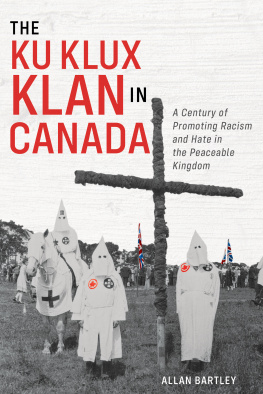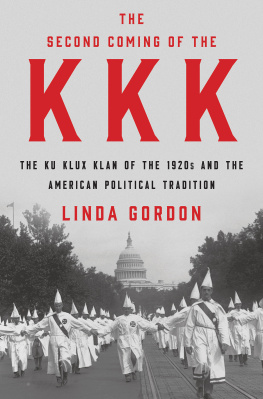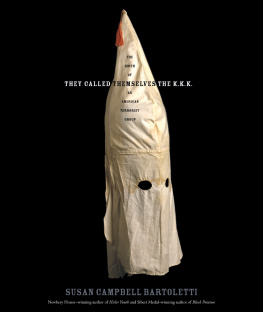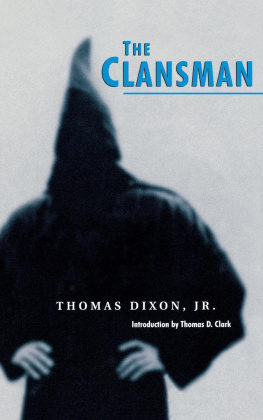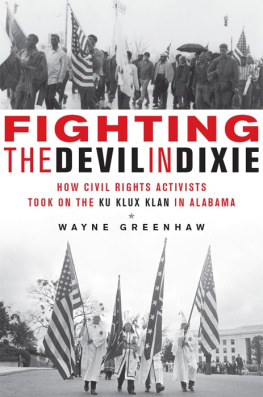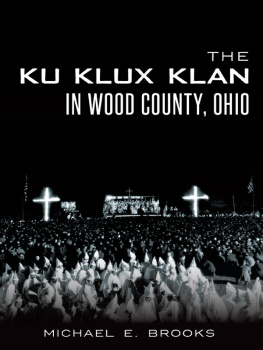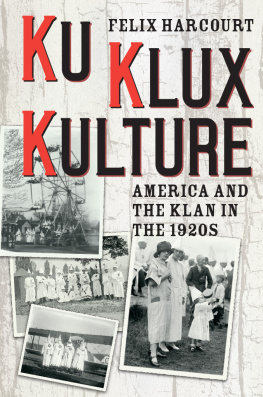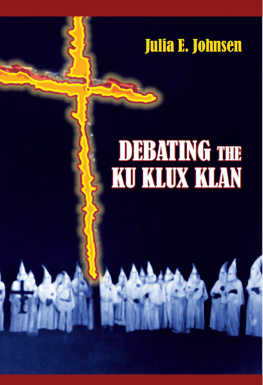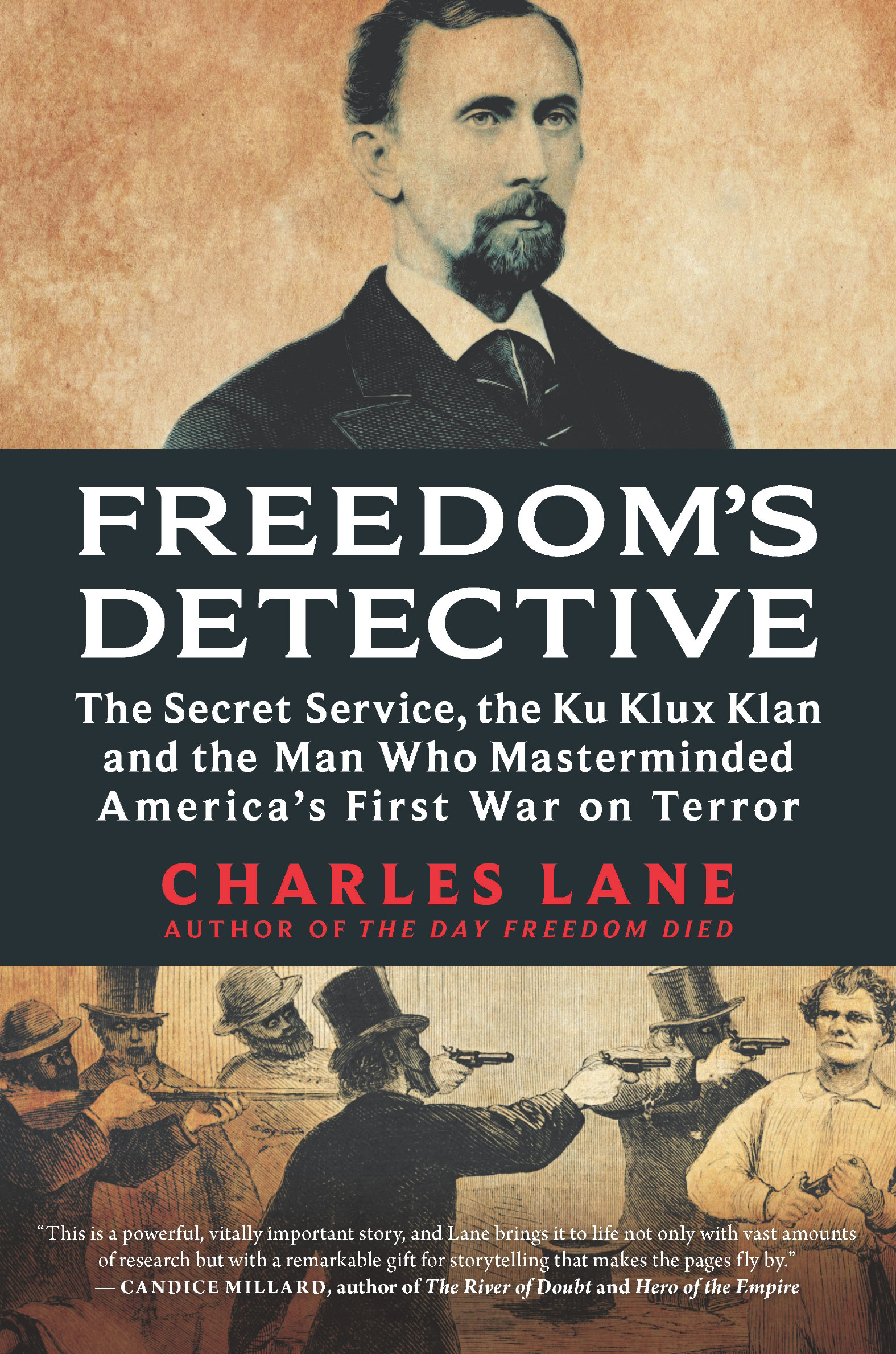
Freedoms Detective reveals the untold story of the Reconstruction-era United States Secret Service and their battle against the Ku Klux Klan, through the career of its controversial chief, Hiram C. Whitley
In the years following the Civil War, a new battle began. Newly freed African American men had gained their voting rights and would soon have a chance to transform Southern politics. Former Confederates and other white supremacists mobilized to stop them. Thus, the KKK was born.
After the first political assassination carried out by the Klan, Washington power brokers looked for help in breaking the growing movement. They found it in Hiram C. Whitley. He became head of the Secret Service, which had previously focused on catching counterfeiters and was at the time the governments only intelligence organization. Whitley and his agents led the covert war against the nascent KKK and were the first to use undercover work in mass crimewhat we now call terrorisminvestigations.
Like many spymasters before and since, Whitley also had a dark side. His penchant for skulduggery and dirty tricks ultimately led to his involvement in a conspiracy that would bring an end to his career and transform the Secret Service.
Populated by intriguing historical charactersfrom President Grant to brave Southerners, both black and white, who stood up to the Klanand told in a brisk narrative style, Freedoms Detective reveals the story of this complex hero and his central role in a long-lost chapter of American history.
ADVANCE PRAISE FOR FREEDOMS DETECTIVE
Charles Lanes Freedoms Detective is a riveting narrative history about early attempts to crack down on and even stamp out the Ku Klux Klans reign of domestic terrorism. The amount of original research Lane conducted is prodigious. His prose style is irresistible. An overall magnificent read!
DOUGLAS BRINKLEY, Katherine Tsanoff Brown Chair in Humanities and professor of history at Rice University and author of Rosa Parks
Freedoms Detective reads like a movie, and Id love to see it. As the KKK rose from the ashes of the Confederacy, the American government rose to the occasion in the form of the much-opposed Secret Service. Charles Lanes biography of former-slave-hunter-turned-undercover-agent Hiram Whitley is a much-needed cautionary tale in an age of rising tyrannythat we must hold our criminals and our cops accountable for their actions.
JARED A. BROCK, author of The Road to Dawn: Josiah Henson and the Story That Sparked the Civil War
With a reporters eye for telling detail, Lane has unearthed a hidden gem of a story. Gripping and insightful, Freedoms Detective reads like a first-rate historical novel. Hiram Whitley, the colorful protagonist, made his mark in the late 1800s, but his story has stunning relevance in 21st Century America.
JULIE COHEN, producer of RBG
Charles Lane has brilliantly reconstructed the hidden history of Americas first Secret Service and its ingenious war on the Klan. At its heart is Americas very own 007: the charming, roguish, and ultimately heroic figure of Hiram C. Whitley. Settle in with this page-turner, and let the story sweep you away.
GARY GERSTLE, author of Liberty and Coercion: The Paradox of American Government from the Founding to the Present
I thought I knew how the Klan was destroyed after the Civil War, but after reading Charles Lanes wonderful book, I realized I knew almost nothing.
LAURENCE LEAMER, author of The Lynching: The Epic Courtroom Battle That Brought Down the Klan
CHARLES LANE is a Washington Post editorial board member and op-ed columnist. A finalist for the 2009 Pulitzer Prize in editorial writing, he was the Posts Supreme Court correspondent prior to joining the editorial board. He has published two previous books, including The Day Freedom Died, which the New York Times called a riveting... legal thriller. As editor of The New Republic, he took action against the journalistic fraud of Stephen Glass, events recounted in the 2003 film Shattered Glass. He has also worked as a foreign correspondent in Europe and Latin America; his articles have appeared in Foreign Affairs, Foreign Policy and The New York Review of Books, among other publications. He is a frequent commentator on TV and radio.
@ChuckLane1
Also by Charles Lane
Stay of Execution
The Day Freedom Died
Freedoms Detective
The Secret Service, the Ku Klux Klan and the Man Who Masterminded Americas First War on Terror
Charles Lane

For Bruce and Ann Lane
Contents
If men were angels, no government would be necessary. If angels were to govern men, neither external nor internal controls on government would be necessary.
James Madison
Let lawyers, judges and sentimentalists say what they will, rogues can only be fought successfully with their own weapons, and any strategy resorted to by the officers to bring them to justice is in my judgment perfectly justifiable.
Hiram C. Whitley, Chief, United States Treasury Secret Service Division, 18691874
He had a summoner ready at hand,
No slyer boy in England, for a band
Of spies the fellow craftily maintained
To let him know where something might be gained.
One lecher hed abide, or two, or more,
If they could lead the way to twenty-four.
Geoffrey Chaucer, The Canterbury Tales
PROLOGUE
Patrick County, Virginia, 1869
Hiram Coombs Whitley sat on his horse and gazed down upon the rushing waters of the Staunton River. The mountain rains, which had fallen so abundantly in that spring of 1869, had turned it into a foaming torrent. The water was so high that it almost touched the low-hanging branches of trees on either side. Now Whitley had to decide whether to cross over from the north bank, where he sat in his saddle, to the south.
He had reached this spot, deep in southern Virginia, on a mission from the new administration of President Ulysses S. Grant, inaugurated a few weeks earlier, on March 4, 1869. President Grants commissioner of Internal Revenue had sent Whitley to crack down on the distillers in the Virginia backcountry who insisted on making and distributing alcohol without paying the federal excise levy. Congress had enacted the tax in 1862, to help fund the Union war effort. Consequently, it had not been enforced in Virginia, or anywhere else in the South, prior to the Confederacys surrender in 1865. For white southern backwoodsmen, making untaxed moonshine was not just a livelihood, but also a way to show defiance of the victorious Union. For the federal government, the deployment of revenue agents like Hiram C. Whitley was not just about tax collection, but about establishing its writ across the entire territory of the United States.
Whitley knew that his destination, the moonshiners stronghold in Patrick County, Virginia, lay on the other side of the white water. It was likely that illegal distillers were counting on the flooded streams of the region to protect them against the likes of him and his companions: two United States Army soldiers, a local guide, and a twenty-year-old clerk in the Treasury Departments Lynchburg, Virginia, branch office, who had met Whitley as he passed through on his way to Patrick County from Washington, and volunteered to join his expedition.
The young mans sense of adventure might have reminded Whitley of himself as a youth. He had left his home on the Ohio frontier many years before, while still a teenager, and he had never really stopped moving since. He had worked on fishing boats out of Gloucester, Massachusetts; slung hash at a makeshift Kansas restaurant; traded sugar and molasses on the Red River of Louisiana; and, of course, he had served the United States as an agent of federal law.
Next page

